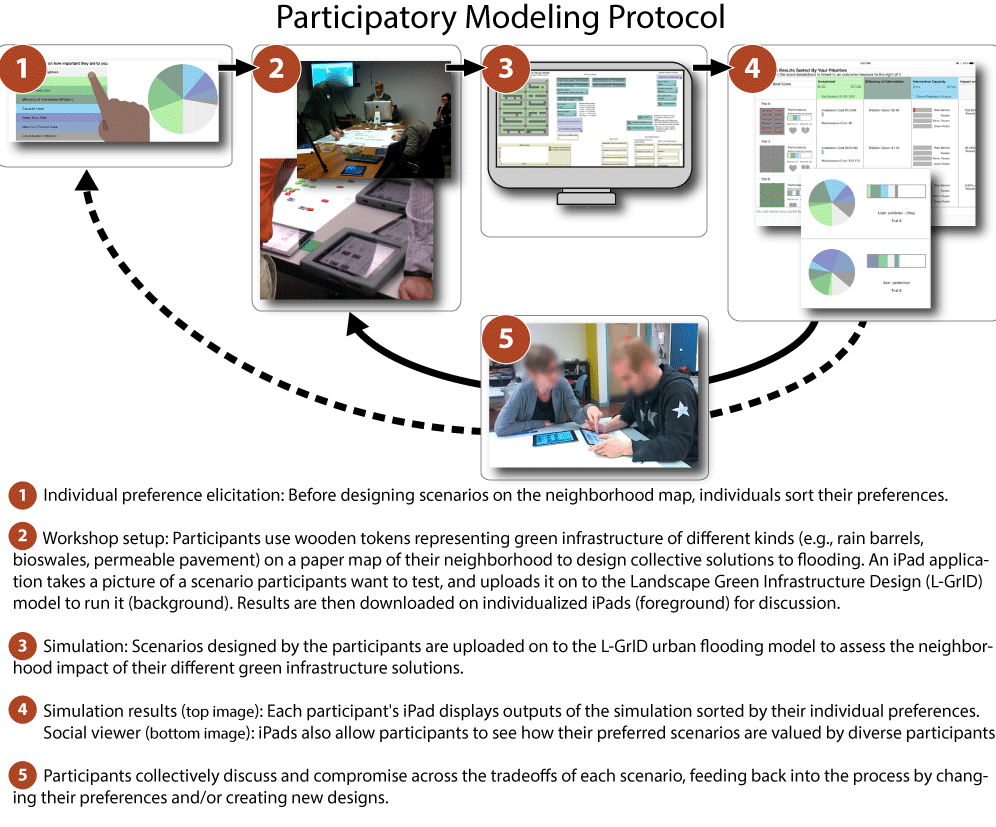Participatory Modeling and Planning for Sustainable Water Management
Introduction
Project title:
Participatory Modeling and Planning for Sustainable Water Management in the Chicago Region (2009-present)
Funding:
National Science Foundation OCI 1135572 ($249,953), REU ($14,000)
UIC Chancellor Discovery Fund, Great Cities Scholar, Institute for Public and Civic Engagement, Department of Urban Planning and Policy ($91,000).
Principal Investigator:
Moira Zellner (Urban Planning and Policy/Institute for Environmental Science and Policy)
Co-Investigators:
Leilah Lyons (Computer Science/Learning Sciences Research Institute), Charles Hoch (Urban Planning and Policy), Joshua Radinsky (Curriculum and Instruction/Learning Sciences Research Institute)
Senior personnel:
Emily Minor (Biological Sciences), Andrew Johnson (Computer Science), William "Max" Dieber (Urban Data Visualization Lab)
Academic staff:
Dean Massey
Graduate students:
Dan Milz, Joey Shelley
Undergraduate students:
Salvador Ariza, Ryan Fogarty, Aloysius Paredes, Lukasz Stempniewicz
Publications:
Journal articles, peer reviewed conference proceedings, and dissertations and theses
Learn here how the application works!
Project Summary

Project summary:
We set out to study how complex systems simulations could support collaborative water planning. We hypothesized that, by allowing participants to see the hidden effects of land- and water-use decisions on water flow, such tools could provide a platform for collective and innovative solution-building to complex environmental problems. We first adopted a developmental and collaborative agent-based approach, where groups of stakeholders learned how to inform and use models to assess the impacts of different implementation strategies. Despite their improved understanding and enhanced exploration of solutions, participants resisted policy innovation beyond familiar strategies. We refined our approach towards facilitated interaction with complex systems models and additional mobile and tangible interfaces to help stakeholders provide direct input to the simulations, comprehend model outputs, and negotiate tradeoffs. Participants challenged outdated and false assumptions and identified novel solutions to their water woes. Three main lessons for participatory modeling and visualization came out of our experiences: 1) keep models and interfaces simple, 2) make both biophysical processes and values visible and tangible, and 3) explicitly structure the social aspects of the simulation’s use. In addition to responding to these needs, we designed our protocol to enhance portability, allowing practitioners to easily deploy it anywhere.
In addition to drawing lessons for participatory modeling and visualization, the research team developed and refined a methodology to assess the collective learning occurring in participatory modeling and planning meetings. There is a paucity of evaluation of participatory processes in planning, mainly due to the lack of established approaches to assess the transformation of stakeholders. Most of the evaluation processes tend to focus on the satisfaction of participants with the process, but rarely examine how much their understanding has changed, how this understanding was applied to the policy discussions, and the types of recommendations and planning judgments emerging from these discussions. Successful collaboration in this field, particularly around computer visualizations, is more often described than explained; its benefits are assumed based on assessments of participants’ satisfaction with the collaborative process rather than on evidence of learning, formulation of new knowledge, and crafting of planning outcomes based on this new knowledge. Such evaluations would, however, enable us to better generalize implications to improve environmental quality. We adapted methodologies from the Learning Sciences to assess how simulation tools mediate planning conversations to address complex environmental problems like flooding and drought. To this effect, we videotaped our meetings, transcribed, coded and analyzed the dialogue for evidence of complex systems learning and policy innovation around the modeling tools.
Our goal is to provide a first version of a protocol for participatory modeling and visualization protocol (simulation models, mobile applications, tangible interfaces and facilitation guidelines), together with an assessment methodology to evaluate its application in practical cases.